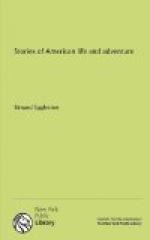The Indians had been very friendly, but the French found out that a plot had been formed to put them all to death. Stakes had even been set up in order to burn some of them alive. There seemed no hope for the Frenchmen to escape. They knew, that, if they tried to get away by land, they should all be killed. If they shut themselves up in their fort, the Indians would besiege them, and they would starve to death. They had no boats by which to get away by sailing through the lakes and down the St. Lawrence River.
The Frenchmen went to work and built boats secretly in the attic of their fort or trading house. They built them strong enough to bear the floating ice. They had also some light canoes made of bark, which they hid in the upper part of their house. The question now was how to get away without the Indians finding it out and pursuing them.
One of the young Frenchmen had been adopted into the tribe of these Indians. He invited the Indians to a feast. It was a feast, of a kind the Indians give, in which every guest is obliged to eat everything that is set before him, leaving nothing. The Indians kept on eating, while the French amused them with dancing and games. The young Frenchman played on his guitar, while the guests ate. The Indians having eaten too much, at length began to fall asleep one by one. The feast was not over until late at night, nor until every Indian had eaten till he begged not to be given any more. Some of the Indians fell asleep while they were eating. The rest of them were soon sleeping soundly in their wigwams.
The Frenchmen now quickly brought their boats down stairs and put them into the water. They loaded them with food and other things needed for their journey. Then they pushed off without making any noise or speaking above a whisper. The water froze about their boats as they rowed, and every moment they feared an attack from the Indians. They rowed all night long, and then they rowed and paddled all the next day without taking any rest. It was not until the evening of the second day that they felt they had passed out of the greatest danger.
The Indians slept late the morning after the feast. When they waked at last, they came out of their huts one by one, and went toward the French house. They were surprised to see it shut up, and everything silent about it. They supposed that the French were at prayer, so they waited quietly outside. They could hear the fowls crowing in the yard, and when they knocked at the door of the house, the dog barked. Noon came, and yet no Frenchmen appeared.
Late in the afternoon the Indians climbed up the side of the house and got in by a window. They could hear no sound but their own steps. They were much frightened as they stole through the house and opened the main door. They searched the building from top to bottom, but not a Frenchman was to be found.
As they were sure that the French had no boats, they were struck with fear. They gazed a moment at each other in silence. Then they fled from the house. They believed that the Frenchmen had, by some magic, made themselves invisible; that is, so that they could not be seen. They believed that the French had flown away through the air, or walked off on the water.




